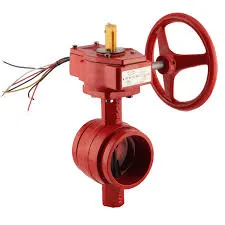
- Call Us
- +8618633052223
- njhdvlz@163.com
Oct . 19, 2024 00:59 Back to list
butterfly valve double flange manufacturers
Understanding Butterfly Valve Double Flange Manufacturers
Butterfly valves are an essential component in various industrial applications, primarily used for regulating flow in piping systems. Among the various designs, double flange butterfly valves stand out due to their robust construction and ease of installation. This article aims to explore the significance of double flange butterfly valves, the manufacturing process, and key manufacturers in the industry.
What is a Double Flange Butterfly Valve?
A double flange butterfly valve features flanges on both sides of the valve body, allowing it to be bolted directly to the flanges of a pipeline. This design improves the valve’s stability and makes it suitable for high-pressure and high-temperature applications. The valve comprises a rotating disc that opens or closes against a seat within the valve body, facilitating flow control with minimal pressure drop across the valve.
Key Features and Advantages
Double flange butterfly valves are known for their lightweight and compact design, making them easy to install and maintain. Other notable advantages include
1. Durability These valves are typically made from high-quality materials such as stainless steel, cast iron, or ductile iron, ensuring they can withstand harsh environments and corrosive substances.
2. Versatility Suitable for various applications, including water treatment, HVAC systems, and oil and gas industries, double flange butterfly valves can handle different media types.
3. Cost-Effective Compared to other valve types, butterfly valves offer a more economical solution while maintaining performance, particularly in larger pipe diameters.
4. Flow Control The valve’s design allows for precise flow regulation and can be operated manually or automatically with actuators.
Manufacturing Process
The manufacturing process of double flange butterfly valves involves several steps
butterfly valve double flange manufacturers

1. Material Selection Manufacturers choose appropriate materials based on the intended application and environmental conditions.
2. Casting and Machining The valve body is formed through casting, followed by machining to ensure high precision and finishing.
3. Assembly Components such as the disc, seat, and actuator are assembled, adhering to stringent quality control measures.
4. Testing Each valve undergoes rigorous testing for pressure, leakage, and operational efficiency to meet industry standards and regulatory requirements.
5. Coating and Packaging Finally, valves are coated for corrosion resistance and packaged for shipment.
Leading Manufacturers
The market for butterfly valve double flange manufacturers is competitive, with several key players excelling in the industry. Some notable manufacturers include
1. FMC Technologies Renowned for their advanced technology and innovative designs. 2. Emerson A significant player with a comprehensive range of flow control solutions, including butterfly valves. 3. Kitz Corporation Known for their high-quality Japanese manufacturing and diverse product offerings in valve technology.
4. Apollo Valves Offers a wide selection of butterfly valves with a focus on durability and performance.
5. Val-Matic Provides reliable and cost-effective butterfly valves, serving various industrial sectors.
Conclusion
Double flange butterfly valves are indispensable in modern piping systems, providing efficient flow control, durability, and versatility. Understanding the manufacturing processes and recognizing leading manufacturers in the industry is crucial for businesses looking to invest in quality valve solutions. As industries evolve, the demand for reliable butterfly valves continues to grow, showcasing the importance of innovation and quality in manufacturing practices.
-
Double Flanged Short Pattern Butterfly Valve | Compact, Efficient Flow
NewsAug.01,2025
-
Precise 3-Inch Butterfly Valve Dimensions | Durable Flow
NewsJul.31,2025
-
3 Butterfly Valve Dimensions | GPT-4 Turbo Precision Specs
NewsJul.31,2025
-
Stainless Steel Sanitary Butterfly Valve for Hygienic Flow Control
NewsJul.30,2025
-
High-Performance Groove Butterfly Valve for Easy Installation
NewsJul.30,2025
-
High-Quality 2 Inch Butterfly Valve for Precise Flow Control
NewsJul.29,2025